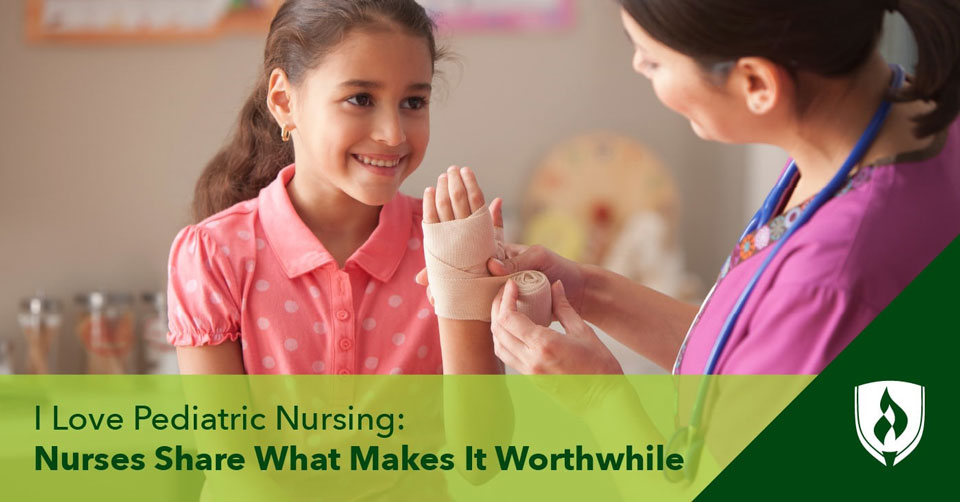
You don’t have to dig deep to reach the conclusion that pediatric nursing is a truly special vocation. Pediatric nurses combine the powerful work of nursing with a particular ability to connect with children. Their warmth and skill can help their patients feel safe during what may be the most trying time of their young lives—and that’s not all there is to love about this nursing role.
“I get to play with my patients,” says Kelsey Koppy, RN and pediatric nurse at Gillette Children’s Hospital.
Koppy says she initially intended to work in the neonatal intensive care unit (NICU) but really enjoyed the higher level of interaction she could have with her patients in pediatrics. “The medical aspects of the job come first, but I can hold some of my patients, take them on walks and talk with them. There’s no way I’m leaving pediatrics.”
If you want to hear more about why these nurses love working in pediatrics, keep reading! We asked nurses in this important specialty to share a bit about what makes their job feel awesome.
I love pediatric nursing because…
I get to watch kids triumph
One of the best things about being a pediatric nurse is helping children succeed and witnessing their joy when they do. “When I worked in oncology, there was a bell that the kids would ring at the completion of their therapy,” says Tyler Dean, certified pediatric nurse and associate professor at Rasmussen University. Dean shares that you could see the hope and relief beam across their faces in that moment when they got to ring the bell.
“Those are my fond memories because it reminds you that you as a nurse played a small part in the journey to help them get to that point,” Dean says. “[It] brings to focus some of the more important parts about life that we might take for granted.”
Nursing in pediatrics is full of optimism
"You hear about how resilient kids are, but to actually see what kids go through and how positive they are. It’s amazing. They bounce back like it was nothing."
Children are a whole different situation when it comes to recovery. When you work with older populations, you get used to certain timetables of healing and come to terms with the body’s limits when repairing. You can throw a lot of that out the window in pediatrics.
“Kids can get really sick and suddenly recover way easier than adults can—it’s mind-blowing,” Koppy says. Since she works in a hospital, many of her patients face serious illnesses, surgeries and injuries, but Koppy says children are almost shockingly positive in their general outlook.
“You hear about how resilient kids are, but to actually see what kids go through and how positive they are. It’s amazing. They bounce back like it was nothing.” Koppy has conversations with some children who take each procedure as a matter of course or even pride. “They’ll be like, ‘This new scar matches the one I got last year’ or ‘Yep, this was my 32nd surgery’ and I’m like—you’re ten. They’re incredible,” Koppy says.
I get to care for the whole family
When your patient is a child, working with their caregivers to help them understand everything that’s happening is a vital part of your job. “Once that child leaves the hospital, it is the family and caregivers that take on that nursing role,” Dean says. “So my client really is the entire family. I enjoy that teaching and caring atmosphere.”
Those connections with adults in your patient’s life can feel particularly strong and meaningful. They trust you with the kids they love more than anything; that tends to create a bond.
I become a very important source of comfort
There are plenty of situations in pediatric nursing where your patients are deeply scared. Maybe it’s something routine, like a preschooler who’s afraid of getting a shot. Or maybe it’s something bigger, like a child and their parents facing a difficult surgery. When you walk into those situations as a pediatric nurse, your ability to calm and comfort your patients and their families is crucial.
“[I love] being able to connect with the child and parents and make it comfortable for all involved,” says Jenny Horner, LPN at Children’s Minnesota® Heart Clinic. She explains that it’s one thing to try to calm a frightened child, but it’s also important to make sure the parents understand and feel comfortable with what the healthcare team is doing with their child. In those moments, your care can mean the world to a family.
I get to bring my inner goofball to work
Pediatric nursing encourages you to bring your goofy, childlike self to the job every day. When you are working with little kids, being great at what you do also means being great at being silly.
“We can be goofy and act like kids because that is how we can build rapport with our clients,” Dean says. Whether that means making funny faces at a younger patient, challenging kids to a contest or just being allowed to be your honest self, professionals who work in pediatrics have the opportunity to bring lots of fun into their working environment.
“Oh, we are very goofy. We are wild,” Koppy says. “And it helps. The kids get to see who you are as a person, and it makes a difference in their compliance with what we need to do.” Koppy says kids can be extremely stubborn if they don’t trust you. That trust happens much more quickly when kids see you as a real person instead of a robotic administrator of care.
The pediatric teams have so much camaraderie
As you can imagine, those fun vibes don’t just impact your patients. Koppy says working in pediatrics can bring you much closer to your colleagues. “Our unit is phenomenal,” she says. “We get along so well, and we feed off each other’s energy.” That connection creates an environment full of trust and camaraderie. Koppy says everyone makes time to help each other. “They will say, ‘You look really busy, can I help you?’ It’s such a good atmosphere.”
I build meaningful connections with my patients
There are plenty of patients you only get to see for a short interval. But Horner says there are also patients you see on a regular basis for a long time.
“I know what it feels like to get through the first year of life with a child who has special challenges,” Horner says. “A family was in the very same spot I was a few years back, with their child requiring a feeding tube and needing open-heart surgery at five months of age.” Horner sympathized with their fear as well as their optimism and says she tries to be their nurse whenever they come in to check on their progress.
I learn to explain things in many different ways
Pediatric nurses have the unique challenge of needing to explain and teach things to patients of a wide variety of ages, along with their adult caregivers. Koppy says it’s a great way to get tons of practice in therapeutic communication. “I’m a huge proponent of honesty,” Koppy says. “I’ll say, we’re going to do a little poke; it will sting for a minute.” Sometimes, being honest really helps kids trust you, and Koppy says sometimes nothing will really work to calm a frightened child. But their unit utilizes tons of different methods to make things a little easier.
“We have videos they can watch that explain things, we have a child life specialist who can bring in stuffed animals to demonstrate on, and when I can, I let the kids try something on me first.” As an example, Koppy says kids often respond well to putting the blood pressure cuff on her arm first to see how it works.
I get to help children
It might be obvious, but at the end of the day—this is what it’s about for so many pediatric nurses. You help kids, and there’s nothing that compares to the reward of watching them heal. “The biggest highlight for me is knowing you played a role in their recovery,” Koppy says. “To have them look at you and say you are their favorite nurse, or you are the best at this or that, it’s so cool.”
One of the indicators that a child is returning to health is in their demeanor. Koppy loves the moments when a patient will look up and say something, and their parents say, “Oh, that’s my kid. My kid is back.”
Pursuing a career as a pediatric nurse
Pediatric nursing, like any healthcare job, is full of challenges, hard days and moments where you feel like you accomplished miracles. But as you can see, there’s so much to love about pediatric nursing.
Does this nursing specialty interest you? Are you excited at the thought of going to work in an environment oriented around kids and their families? If you are thinking yes to any of that, check out What You Need To Know Before Becoming a Pediatric Nurse.
Children’s Minnesota is a registered trademark of Children’s Health Care, Inc.




